Know your social media shortcuts
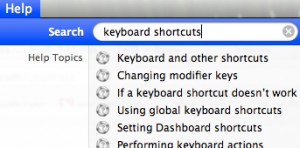 Keyboard shortcuts are essential for audio and video editing programs allowing you to work efficiently and save time without having to rely on the mouse for every function.
Keyboard shortcuts are essential for audio and video editing programs allowing you to work efficiently and save time without having to rely on the mouse for every function.
But what about shortcuts for navigating around social media services?
Check out these guides to keyboard shortcuts for Twitter and Facebook from Socialbakers: both for PC and Mac users and across different browsers.
It’s worth noting if you use Tweetdeck on your desktop you can also find the shortcut menu from Shift+ ? .
![]() read more
read more
The media in a state of “present shock”
What on earth you may ask is “present shock”?
This might be a question to ponder as your mobile device begs your social media attention with constant beeps, buzzes and status updates, while a good book or periodical lies idle beside you.
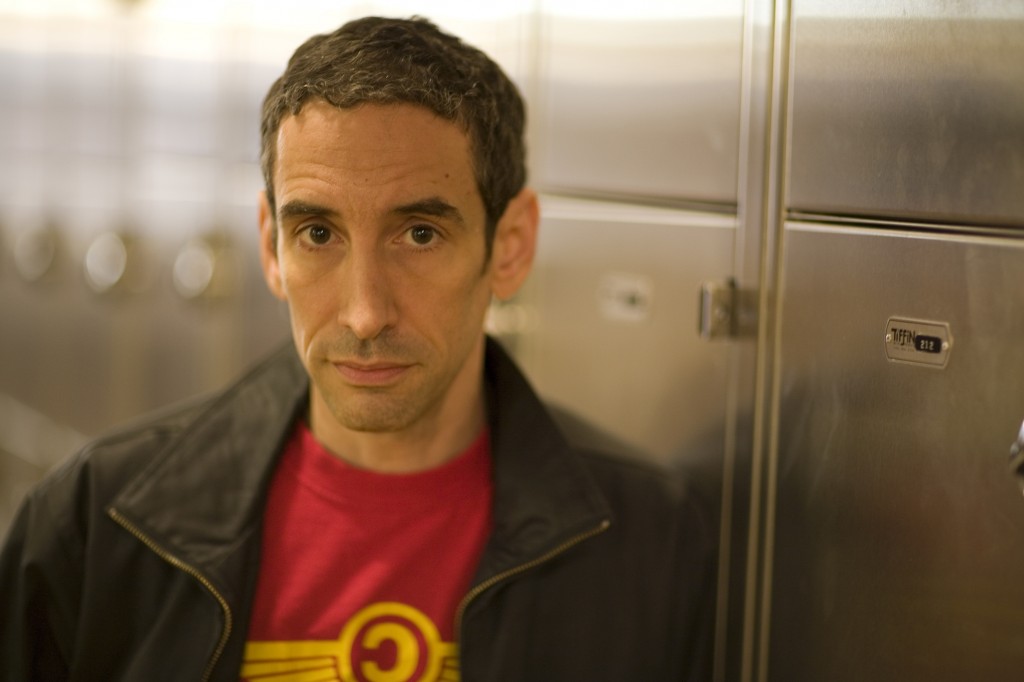
Rushkoff: “If the end of the twentieth century can be characterized by futurism, the twenty-first can be defined by presentism.” Photo: Johannes Kroemer
In his latest book, Present Shock: When Everything Happens Now, media theorist Douglas Rushkoff writes, “Our society has reoriented itself to the present moment. Everything is live, real time, and always-on.”
In an interview with the Nieman Journalism Lab, Rushkoff offers some interesting thoughts on how “present shock” affects media – especially the move towards live blogging, live tweeting or live streaming news versus journalism that gathers the facts and provides analysis.
![]() read more
read more
Distant witness: NPR’s Andy Carvin tweeting news and revolutions
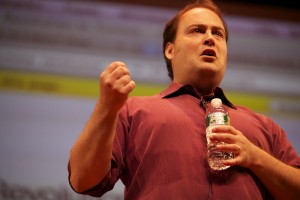 Andy Carvin is a senior strategist at National Public Radio (NPR) and leads their social media strategy. He describes himself as a “real-time informational DJ and occasional journalist, but not a social media guru”, although many would regard him as just that.
Andy Carvin is a senior strategist at National Public Radio (NPR) and leads their social media strategy. He describes himself as a “real-time informational DJ and occasional journalist, but not a social media guru”, although many would regard him as just that.
Andy Carvin’s Twitter feed @acarvin is regarded as essential for following breaking news events, particularly in the Middle East. Carvin has some 88,000 followers on Twitter. But it’s his method of aggregating, filtering and verifying news sources through social media that has attracted global attention.
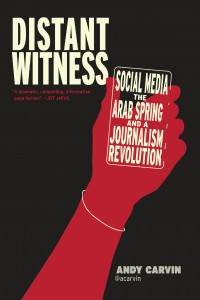 Carvin’s new book Distant Witness (CUNY Journalism Press) explores how social media and the Arab Spring have caused a revolution in journalism. It’s essential reading for journalists. Not only does Carvin tell a compelling story, interwoven with gripping Tweets, he offers insight into citizen journalism and how news organisations can use social media effectively. As Carvin puts it: “storytelling has entered new territory”.
Carvin’s new book Distant Witness (CUNY Journalism Press) explores how social media and the Arab Spring have caused a revolution in journalism. It’s essential reading for journalists. Not only does Carvin tell a compelling story, interwoven with gripping Tweets, he offers insight into citizen journalism and how news organisations can use social media effectively. As Carvin puts it: “storytelling has entered new territory”.
From the overthrow of President Ben Ali in Tunisia in 2011, Carvin explains how he was able to build upon his own knowledge of the Tunisian blogosphere, and develop a network of reliable sources on Twitter. But when he needed help for translations or to verify sources such as videos on YouTube, Carvin called for volunteers from his Twitter followers.
This method Carvin writes, “increases the chances of me getting a fast response, it also lets me cross-reference translations from multiple people, improving the overall accuracy.”
For Carvin, Tunisia would be the start of an extraordinary period of live tweeting revolutions and protests across the Arab world.
“And we had witnessed it online, from start to finish, not through the lens of mainstream media, but through protestors themselves.”
Deutsche Welle’s Rachel Baig asked Andy Carvin about citizen journalism and working as a “living, breathing real-time verification” machine.
![]() read more
read more
Tweets help visualize information density of African cities
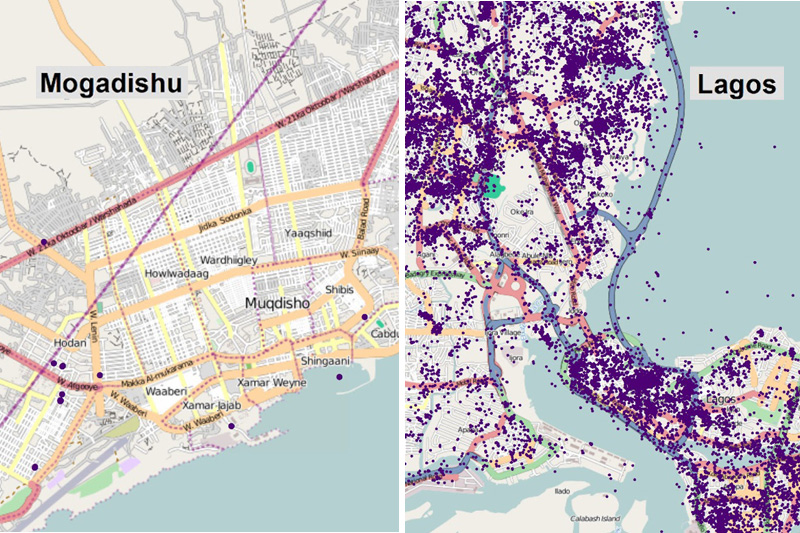
Cities are more than a collection of streets and houses or people and plants. “Cities have become both digital and digitized”, says Mark Graham, Director of Research and a Research Fellow at the Oxford Internet Institute. These days an indicator of the development of a modern city is not just its physical infrastructure.
In dozens of cities across Africa, Graham has produced a visualization of geocoded Tweets. And an interesting pattern emerges, showing the footprint of internet penetration and the use of mobile devices. While in cities such as Nairobi, Cairo or Cape Town you can see important information hubs, other cities such as Mogadishu and Addis Ababa remain almost completely blank.
![]() read more
read more
What role did social media really play in Egypt’s Arab Spring uprising?
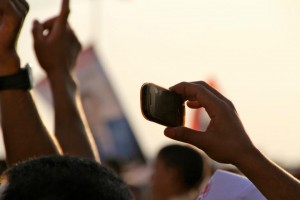 The words ‘Facebook revolution’ come up in virtually every discussion of the protests and political upheavals that swept the Arabic world at the end of 2010 and early 2011. Opinion is still divided though about the exact role that social media played in sparking and sustaining the Arab revolutions. Now, in research that took her to Egypt to extensively interview activists involved in the uprising there, a DW Akademie International Media Studies student has some surprising conclusions on the topic. DW Akademie spoke to Eira Martens about her research.
The words ‘Facebook revolution’ come up in virtually every discussion of the protests and political upheavals that swept the Arabic world at the end of 2010 and early 2011. Opinion is still divided though about the exact role that social media played in sparking and sustaining the Arab revolutions. Now, in research that took her to Egypt to extensively interview activists involved in the uprising there, a DW Akademie International Media Studies student has some surprising conclusions on the topic. DW Akademie spoke to Eira Martens about her research.
![]() read more
read more
How ARD, BBC and CNN verify social media content
 Be it the death of Osama bin Laden, the emergency landing of a plane on the Hudson River or armed conflict in Syria, photos and videos made by eye witnesses usually reach the public as initial evidence through breaking news. Today, media organizations are virtually flooded with digital content from all over the world which makes it even more important to pay attention to the sources of information. That is why large media organizations have set up special research teams to verify the content from social networks. Although most of them follow the same rules, it is worthwhile to compare the separate approaches. Konrad Weber shows how renowned international media outlets such as ARD, BBC, CNN and others check the content coming from social media.
Be it the death of Osama bin Laden, the emergency landing of a plane on the Hudson River or armed conflict in Syria, photos and videos made by eye witnesses usually reach the public as initial evidence through breaking news. Today, media organizations are virtually flooded with digital content from all over the world which makes it even more important to pay attention to the sources of information. That is why large media organizations have set up special research teams to verify the content from social networks. Although most of them follow the same rules, it is worthwhile to compare the separate approaches. Konrad Weber shows how renowned international media outlets such as ARD, BBC, CNN and others check the content coming from social media.
![]() read more
read more
A guide for journalists to get the most out of Twitter
 Twitter is a great tool to promote your stories and enhance your online identity. Treat your Twitter account as your business card. It should look professional, individual and cool.
Twitter is a great tool to promote your stories and enhance your online identity. Treat your Twitter account as your business card. It should look professional, individual and cool.
That’s why it’s important to customize your Twitter page. If you have a personal blog, see to it that the colors are alike and that you use the same profile photo.
And yes, it is absolutely imperative that you upload a good-looking photo of yourself. Standard red and orange eggs aren’t likely to make a good impression on your audience. If you want them to mind you, you first have to mind them, right? So upload a photo.
![]() read more
read more
Power and potential of social media in South Africa
Sarah Britten is a South African communication strategist, blogger, journalist, author and a contributor to Memeburn, a website devoted to digital trends. She is particularly interested in new media and how technology and media can work together for development. DW-Akademie’s Franziska Harich met Sarah at the recent Forum Medien und Entwicklung Symposium 2011 (FoME) in Bonn and asked her about social media in South Africa and the proposal of the African National Congress (ANC) to create a government appointed media appeals tribunal – a move that has been widely criticised by South African media.
![]() read more
read more
7 tips on creating an effective Facebook link
For many, Facebook has changed the face of the media landscape for good. Along with other social networking sites, it’s an important way for news consumers to filter updates from their favorite sources or on events of particular interest to them. It’s also how they share stories amongst their circles of friends.
In turn Facebook and other social media platforms have become key distribution channels for news websites. So it’s all the more important for online news sources to effectively market their content to social media outlets.
German blogger Claus Hesseling has compiled some useful tips for journalists who want to make the most of that potentially added exposure. With his kind permission, you can read a translation of his summary below.
![]() read more
read more
#bbcsms – a social media summit
It’s probably the mark of a good conference that thought provoking conversation (and a fair bit of debate!) continues to bubble away long after everyone has gone home. That’s the beauty of social media and that’s what you’ll find if you search Twitter for #bbcsms – the BBC College of Journalism Social Media Summit on how mainstream media is dealing with the challenges posed by social media.
But before you dive into the conversation, check out the conference reports from the CoJo website and you can watch each session on YouTube. It’s an excellent resource.
All of the sessions were informative, but for the sake of brevity here are a couple of highlights.
Social media in the newsroom: carrots and sticks or sandwich?
What elements are needed to make cultural change happen in a newsroom? was the big question for the panel on the opening session.
![]() read more
read more



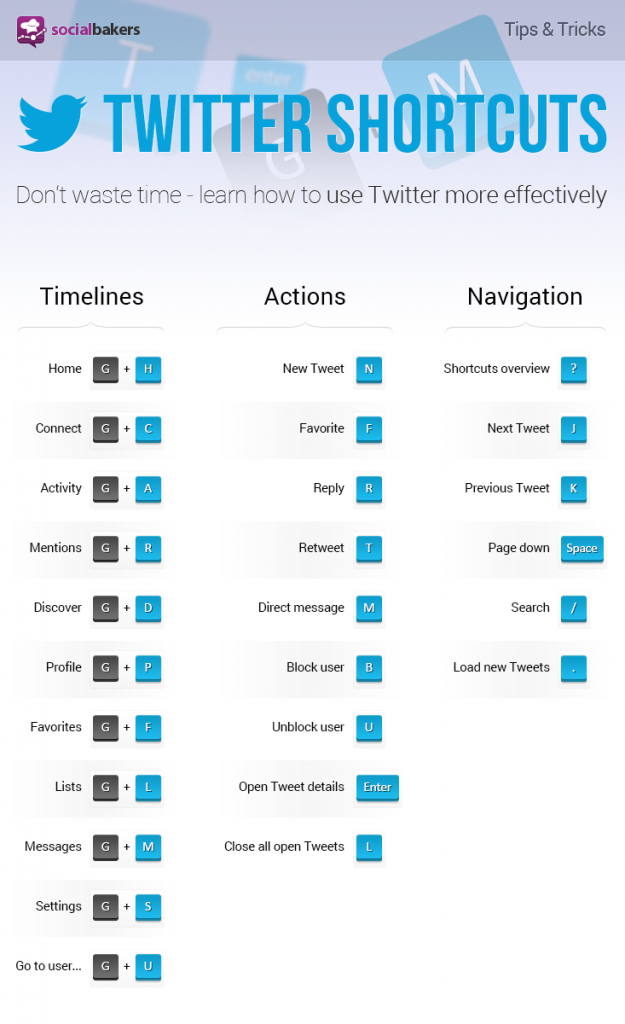

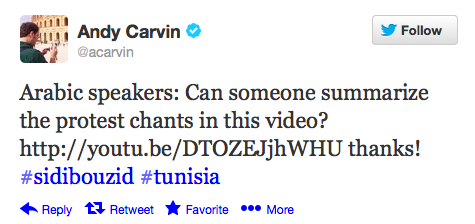






Feedback